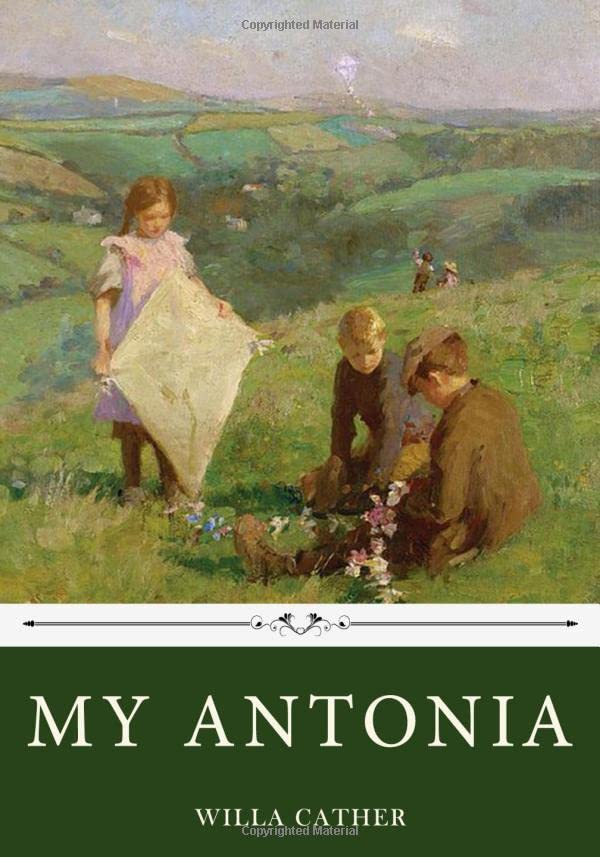
The celebrated turn-of-the-twentieth century novelist Willa Cather wrote a trilogy of novels that focus on life on the Nebraska prairie: O Pioneers, My Ántonia, and the most autobiographical of the three, The Song of the Lark. Having read O Pioneers a few years ago, my church readers’ group took up My Ántonia this year. It is considered by many Cather’s greatest work and an exemplary expression of the prairie/pioneer genre.
My Ántonia tells the story of an immigrant family from Bohemia, the Shimerdas, and their struggle to forge a life on the prairie. The story centers around Ántonia, the oldest daughter of the family, and Jim Burden, a boy who has come to live on the prairie with his grandparents after the death of his parents. Now years later, the story recounts, from Jim’s re-telling, the relationship between Jim, Ántonia, and their friends throughout their childhood years and into early adulthood.
As with all the novels in Cather’s Prairie Trilogy, and many of her novels in general, the land is in a sense a primary character in My Ántonia. The Divide, a region near Red Cloud, Nebraska—where Cather’s family relocated when Cather was ten—is the setting for Black Hawk, the central town in My Ántonia (and in O Pioneers). Even as the pioneers forge the land, the land is forging them. It is easy for us twenty-first-century Americans to forget the intimate connection between the land of the Americas and the creation of the American ethos. It is a connection that God intended us to have, one worth re-forging.
Amid charting a course of life on the prairie, Cather develops characters we enjoy getting to know. We can resonate with their struggles and suffering, rejoice in their triumphs, and understand the complications of life and relationship brought on by the struggle with human willfulness and sin. In My Ántonia. Jim and Ántonia are at the center of those resonances. And it is in their lives that we begin to find our place: in relationship to the land God created, to one another, and to the stories of our lives. As Jim says of Ántonia, “More than any other person we remembered, this girl seemed to mean to us the country, the conditions, the whole adventure of our childhood. To speak her name was to call up pictures of people and places, to set a quiet drama going on in one’s brain” [Willa Cather, My Ántonia (New York: Barnes and Noble Books, 2003), 5]. She resided at the center of Jim’s memory of his childhood, of his development, of his narrating of his own life.
Therein resides a central theme of the novel: Memory. On the title page Cather subscribed a phrase from Virgil’s Georgics (pastoral descriptions of classical rural life): Optima dies . . . prima fugit—“the best days are the first to flee.” In My Ántonia, Jim is actively remembering, recalling days now distant (the first to flee), but filled with all the emotions of human life, engaged on the land of the prairie, and with deep personal significance and meaning. The act of remembering is vitally important for all of us. Those stories of the best days orient our lives in the present and have the capacity to propel us into the future. It is for this reason Christians remember “On the night when he was betrayed, our Lord Jesus took bread and said, ‘This is my body.’” That remembrance orients our present and propels us into the future. Remembrance ends Cather’s novel as Jim stands at the fading road that had led from Black Hawk into the Divide:
I had the sense of coming home to myself, and of having found out what a little circle man’s experience is. For Ántonia and for me, this had been the road of Destiny; had taken us to those early accidents of fortune which predetermined for us all that we can ever be. Now I understood that the same road was to bring us together again. Whatever we had missed, we possessed together the precious, the incommunicable past. (My Ántonia, 222)
For Christians, remembering brings us to encounter more than what destiny and fortune can deliver. In the words of Paul in 1 Corinthians 3:22–23, “For all things are yours, whether Paul or Apollos or Cephas or the world or life or death or the present or the future—all are yours, and you are Christ’s, and Christ is God’s.” The best days may be the first to flee, but they will all return to us in him who is the Alpha and the Omega.



Leave a Reply
You must be logged in to post a comment.